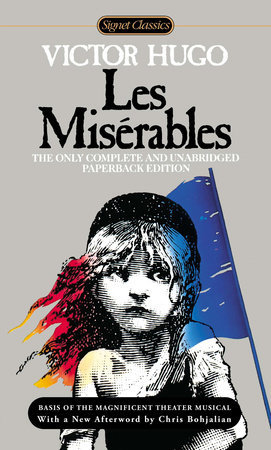22. A book you’re intimidated by: Les Miserables by Victor Hugo

List Progress: 1/30
I am a fairly confident reader at this point in my life, but I still have some books I shy away from. And the prospect of reading 1200 pages, in small type, of dense French literature has always been a bit daunting (despite the fact that I have multiple friends who have read it). I had put off Les Miserables, the 1862 novel by Victor Hugo, for a long time, and 2019 was the time to finally tackle it…even if it took me into 2020 to finish it. I had seen the movie and was familiar with the musical, so I was intrigued to see how the uncut book would come across. “Very inconsistently” turned out to be the answer.
Les Miserables follows the life of a convict, Jean Valjean, who is released from prison and is inspired to become a good man, but realizes that he must skip his parole and make a clean start to do so, as the “justice” system places such fetters on the formerly-incarcerated. He goes through many different new lives over the course of his freedom, but is always looking over his shoulder for danger to find him, often in the form of Inspector Javert, a police inspector who believes in Law over Good to such a fanatical degree that it rules his very soul. Valjean’s story crosses into Fantine’s, a single mother driven into poverty and prostitution, and after her tragic death, he adopts her young daughter Cosette. He raises Cosette until she is a young woman, and her story brings them both to meet Marius, a college student who becomes involved in the 1832 June Rebellion in Paris. In addition to all of them, you also have Cosette’s former foster parents, the conniving Thenardier’s, and their daughter Eponine who falls in love with Marius, and their young son Gavroche who lives as a street urchin eager to join the growing uprising. And that’s even before you get to the revolutionary leader Enjolras and his crew. While Les Miserables is technically Jean Valjean’s story, it does its best work when it is telling the story of an era, showing lives that serve as representations of broad social trends. Fantine is a person, certainly, but she is also a symbol and a treatise on what prostitution can do to the vulnerable. Victor Hugo is often mocked for his lengthy diversions into historical side-bars, but most of them work well as continuations of the central conceit of a working man’s history. (Aside from the Waterloo chapters, I could not stand those.)
No, what Hugo should be mocked for is how thin and trite the story’s romance is. The musical adaptation did Marius a lot of favors in being less whiny, self-centered and dull, and aged up Cosette to avoid the downright creepiness of a 23 year old lawyer becoming obsessed with a 15 year old he had never spoken to and stalks until her father has the move houses to get away. Jean Valjean and Javert are both rich, complex characters, and even some of the side characters are fascinating jumbles of contradictions and pain, but Marius and Cosette are just made of Classical Romance tropes that did nothing for me. My favorite character ended up being Gavroche: a young boy living on his own and thinking he knows the ways of the world, only to get caught up in matters more serious than he can comprehend. When the main couple had scenes intercut between Gavroche’s adventures, I know which ones I was eager to skim through and which I wanted to spend time with.
So would I recommend it? I’m honestly not sure. I am glad I went through the experience and I think that was a lot of beautiful writing (and compelling arguments about justice and injustice for the formerly incarcerated). But I don’t think I needed to spend 1200 pages in it, and unfortunately an abridged copy would not help, as I am far more eager to skip some of the main characters than the 20 page history of the Paris sewers (which was oddly fascinating). So while I’m glad I did it and started off the year by finishing a paper brick, it will be a long time before I read any more Victor Hugo.
Would I Recommend It: If you really love the musical or big doorstopper challenges.
I read Les Misérables- never would have if I did not have an obsessive love of the musical. My knowledge of the musical helped me get through the book
LikeLike
Oh yes, there were definitely some sections that I would have skimmed if I didn’t know their eventual importance from the musical. Though I will say, the book was the first time I really felt like I understood Javert and the Thenardiers, with so much more time to study them. Both versions are such valuable pieces of art.
LikeLike